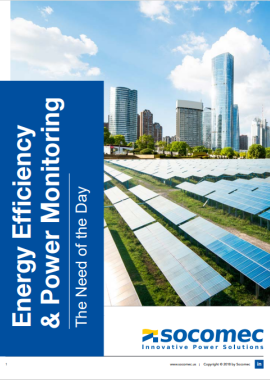Often, tenants are responsible for all if not the majority of utility costs, but it’s still an issue that affects your bottom line. Building owners that cover electricity for their tenants will definitely feel the pain, especially in high usage seasons such as summer and winter. And with code restrictions getting more austere, providing tenants with education about energy efficiency is an important part of maintaining your properties. With information, they can take ownership of their energy consumption and put a plan in place to reduce it.
Share Energy Consumption and Cost Data
Most people have no idea how much energy their building or space uses each month. Energy bills tend to be esoteric tallies of energy consumption metrics that the average person has no interest in (or clue about) dissecting. Many people are convinced that energy consumption is a set value that can’t be changed. This is where property managers can empower their tenants. By giving tenants data about monthly energy consumption and its cost, property managers can help them understand what those numbers mean. From there they can make actual changes to building energy usage. Implementing energy saving strategies or installing energy efficient equipment can help tenants reduce their consumption. Just using simple strategies such as making sure all lights and computers are turned off after working hours can save tenants and owners hundreds and even thousands on utilities each year.
Use Energy Monitoring to Promote Awareness
People want to be part of the solution to the problems that affect them. Energy consumption is a problem for our whole society, but only a segment of industry professionals have all the information they need to make actionable changes to reduce it. Most home and business owners have heard and seen advertising for energy efficient light bulbs and appliances, but beyond that they are not given the knowledge base they need to truly make an impact and control their energy usage.
Energy monitoring and reporting can give them the information they need to do just that. Energy efficient appliances and green building practices can reduce energy waste, but seeing how energy is consumed can enlighten tenants about their operational habits and give them the information they need to make changes. Some ways to accomplish this include:
- Timers: Leaving the lights on is a major waste of energy. Sure, those energy efficient fixtures can help, but leaving them on not only wastes energy – it also reduces their lifespan. Placing lighting systems on timers will give tenants the ability to set operation hours with automatic switch offs at the end of the working day.
- Occupancy Sensors: Occupancy sensors can have the same benefits as timers, but with more flexibility. Occupancy sensors in bathrooms can turn off lights and exhaust fans when no occupants are sensed. They can be put on a variable timer as well. They automatically go back into operation when an occupant is sensed in the room, unlike lighting timers.
- Building Management Systems: The most comprehensive way to control your building’s energy consumption is by integrating all energy consuming systems digitally in a building management system (BMS). These systems can be remote, making them easy to manage from anywhere. With smart metering devices, you can monitor each system in your building individually. HVAC systems with smart controls can be integrated with a BMS so that you can control factors like temperature, when they are operational, and the amount of outside air that comes into a building. Lighting systems can also be monitored and controlled from the BMS.
- Energy Monitoring Devices: One of the best ways to assess energy usage in a building is to monitor individual equipment and appliances. Energy metering can be done on a micro level for everything from HVAC systems to coffee pots. Advanced metering devices can give you real time consumption values with digital interfaces.
Information is the key ingredient to making positive improvements in a business. As a property manager, maintaining your properties and keeping tenants happy are both important to profitability. Energy conservation is an area that is often overlooked and undervalued when it comes to business plans, but making it a priority for you and your tenants can reduce energy bills, give you a sense of environmental responsibility, and improve the lifespan and quality of your building’s operational systems. You can learn more about what you can do to reduce energy consumption and start saving today with our white paper, Energy Efficiency & Power Monitoring: The Need of the Day.







